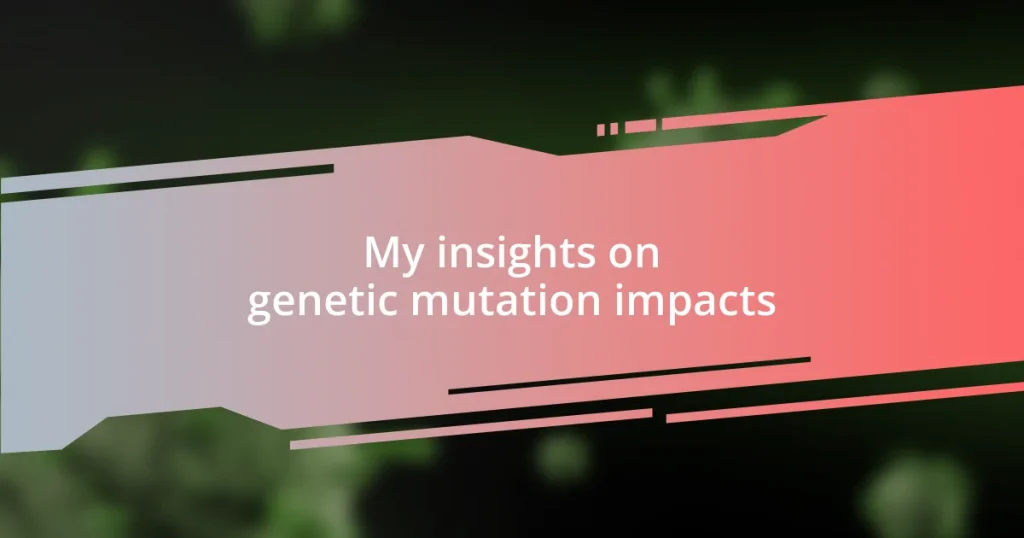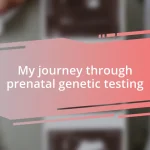Key takeaways:
- Genetic mutations play a crucial role in health, evolution, and disease, influencing traits and potential health risks, as evidenced by personal stories and scientific examples.
- Various types of genetic mutations, including point mutations and translocations, can have significant health implications, ranging from benign effects to severe diseases like cancer and genetic disorders.
- The future of genetic mutation research, particularly with advancements like CRISPR and AI, promises to enhance understanding and treatment of diseases but also raises ethical concerns regarding genetic manipulation and privacy.
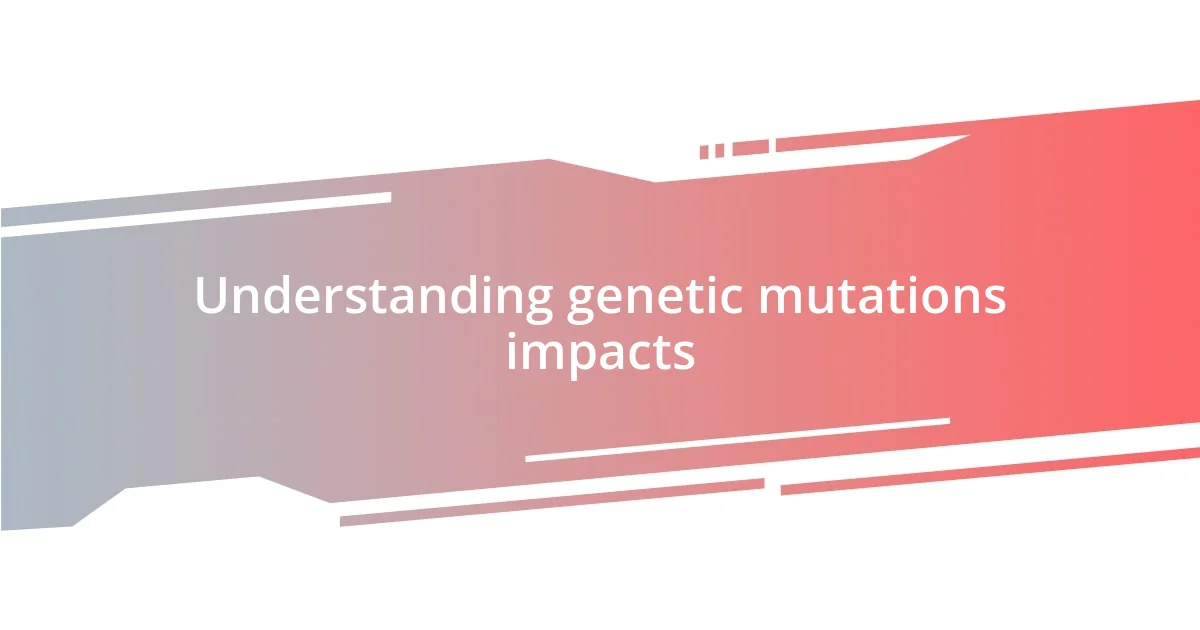
Understanding genetic mutations impacts
Genetic mutations are at the heart of everything from evolution to disease. I remember when my friend discovered through genetic testing that a mutation in her BRCA1 gene increased her risk for breast cancer. It hit me hard; it’s not just science fiction—it’s real life, reshaping her future and sparking conversations about preventive measures.
Have you ever considered how often mutations can be neutral or even beneficial? For example, some mutations might confer advantages, like resistance to certain diseases. I find this fascinating because it highlights how our DNA is constantly adapting, almost like a silent narrative unfolding within us, shaping who we are over generations.
The emotional toll of understanding genetic mutations can’t be understated. It can feel overwhelming to realize that our genetic makeup has a say in our health outcomes. When I learned about mutations affecting a family member’s condition, it made me wonder: How much do we truly understand about the hidden stories within our DNA? Each mutation carries a weight of information, and I believe it’s essential to approach this knowledge with both curiosity and care.
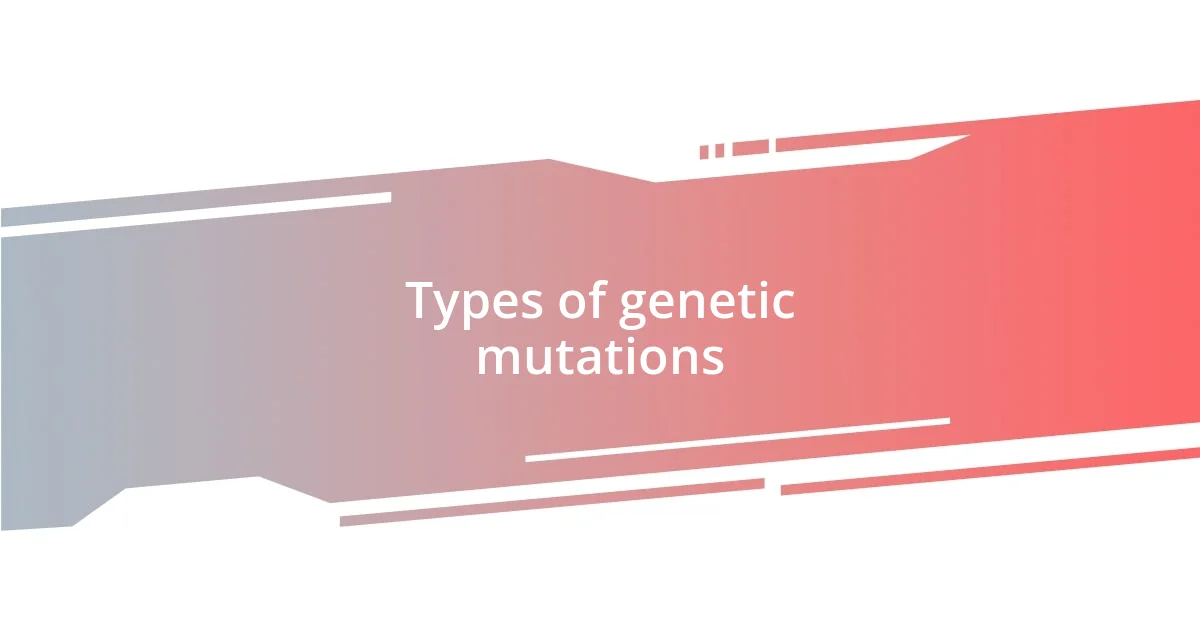
Types of genetic mutations
Genetic mutations can be generally categorized into several types, each with unique implications. I recall a time when a family member mentioned a frameshift mutation in their genetic report; it struck me how such a small change could lead to significant health issues. I’ve come to appreciate that these alterations in the DNA sequence can range from tiny substitutions to large deletions or insertions, profoundly influencing an individual’s traits or diseases.
Here’s a breakdown of the main types of genetic mutations:
- Point Mutations: These involve a change in a single nucleotide, which can be silent, missense, or nonsense, depending on how the alteration affects protein coding.
- Frameshift Mutations: Caused by insertions or deletions that shift the reading frame of the gene, potentially leading to entirely different or nonfunctional proteins.
- Copy Number Variations: This type includes duplications or deletions of large segments of DNA, affecting gene dosage and potentially leading to disorders.
- Inversions: These occur when a segment of DNA is flipped in orientation, which can disrupt normal gene function.
- Translocations: This involves pieces of DNA being rearranged between non-homologous chromosomes, sometimes leading to cancer.
Each of these mutations has its own narrative, much like characters in a story, showing how delicate the balance of our genetic makeup can be. It’s intriguing how something as seemingly invisible as a genetic mutation holds so much potential to impact lives and shapes our health experiences in tangible ways.
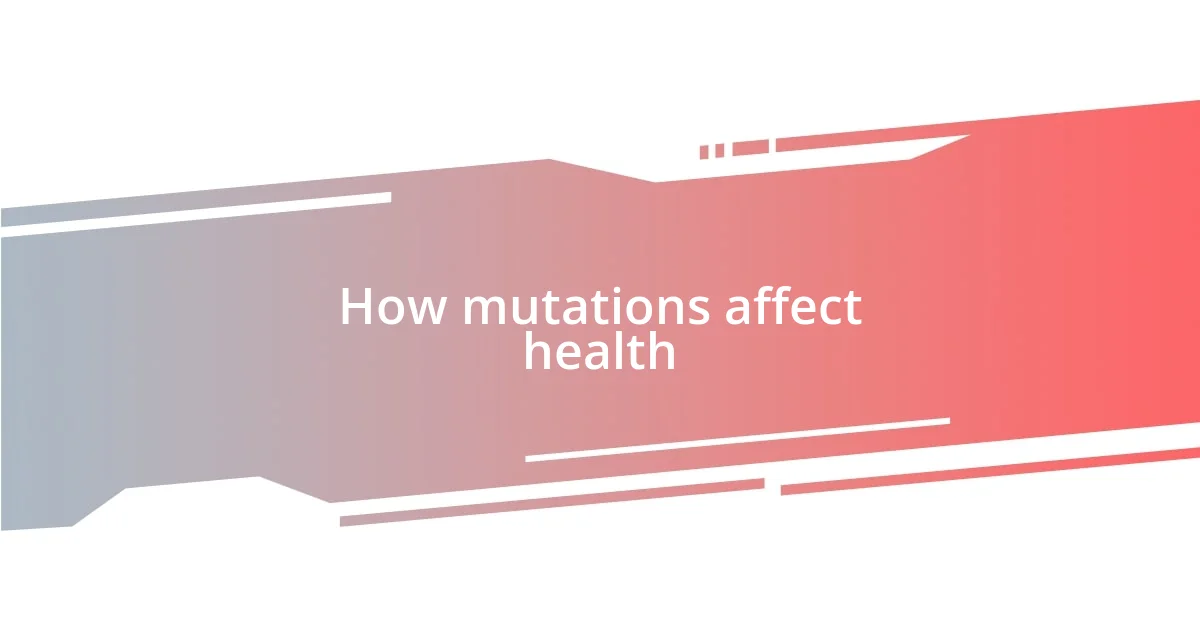
How mutations affect health
Genetic mutations profoundly influence health in various ways. Some mutations can lead to inherited diseases, while others may not show immediate effects. I remember discussing the implications of a particular mutation with a friend who worried about her family’s history of Huntington’s disease. Her concern truly illustrated how mutations can be a ticking time bomb, not just impacting one life but echoing through future generations.
Moreover, not every mutation is detrimental. For instance, a variation in the CCR5 gene can provide resistance to certain strains of HIV. This scenario makes me reflect on the dual nature of mutations—while they can introduce risks, they also hold the potential to enhance survival in certain environments. It’s a reminder that our genetic stories are complex, woven with threads of both challenge and resilience.
Additionally, environmental factors can interact with genetic mutations, compounding their effects. I recently read about someone with a mutation that increased their susceptibility to heart disease. Yet, through lifestyle changes like diet and exercise, they managed to significantly reduce their health risks. This personal journey reinforces my belief that understanding our genetic makeup allows us to take proactive steps toward better health.
| Type of Mutation | Health Impact |
|---|---|
| Point Mutation | May lead to diseases like cystic fibrosis or form of sickle cell anemia based on the protein affected. |
| Frameshift Mutation | Can result in severe conditions like muscular dystrophy due to disrupted protein function. |
| Copy Number Variation | Linked to various disorders, including autism and schizophrenia, due to dosage imbalances. |
| Inversion | Can disrupt normal gene function, leading to increased cancer susceptibility. |
| Translocation | Commonly associated with cancers, such as certain types of leukemia, through the rearrangement of genetic material. |
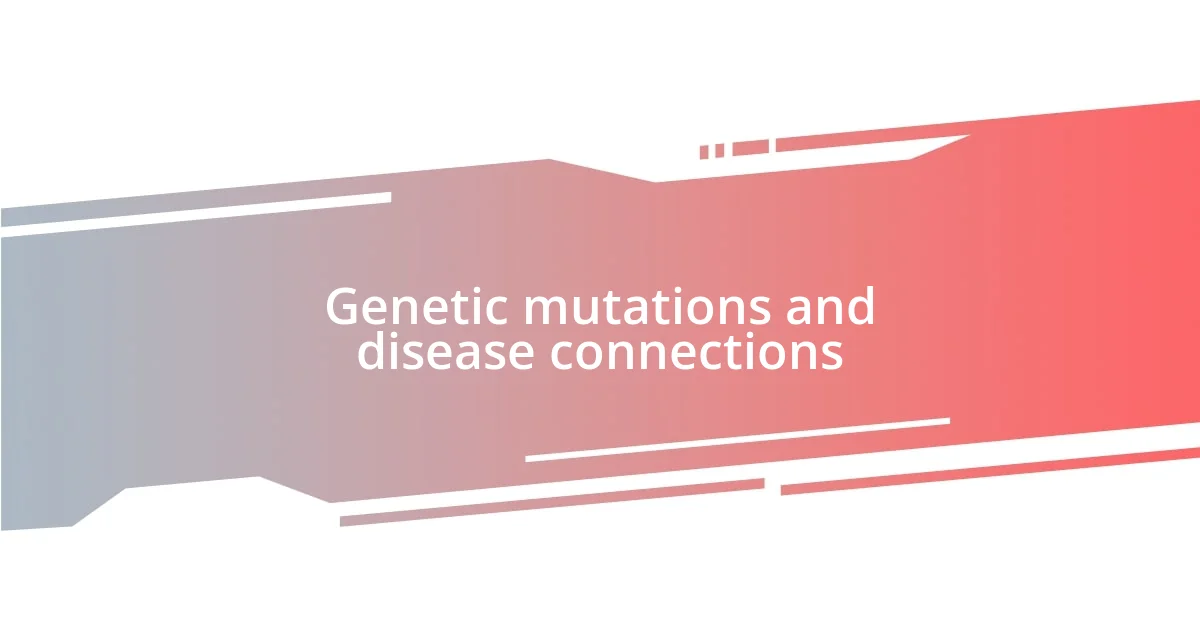
Genetic mutations and disease connections
Genetic mutations can have a direct line to various diseases, a concept that has become quite evident in my life. I once learned about a friend whose whole family was affected by BRCA1 mutations leading to breast cancer. It was heartbreaking to watch her navigate this reality, knowing that genetics played such a personal role in her health. This experience reinforced for me how certain mutations not only increase susceptibility to diseases but also bring a burden of anxiety and uncertainty to families.
Reflecting on my own genetic screening, I discovered a benign variant linked to increased cholesterol levels. At first, I felt a wave of worry, but then I realized that understanding this mutation allowed me to make lifestyle adjustments to mitigate potential health risks. Isn’t it fascinating how knowledge empowers us? It’s a reminder that our genetic blueprint is just one part of a much larger picture, and addressing these mutations can open up pathways to preventing illness.
Moreover, the connection between genetic mutations and conditions like neurodegenerative diseases often keeps me up at night. I once attended a support group where individuals shared their experiences with Alzheimer’s disease linked to genetic predispositions. Hearing their stories struck me: how many of them had lived in fear of what was to come? It highlighted the emotional struggle that genetic mutations can impose, as they serve as a reminder of the delicate interplay between genetics and fate. Do these mutations simply chart our course, or do we still hold the reins to our destiny through awareness and action?
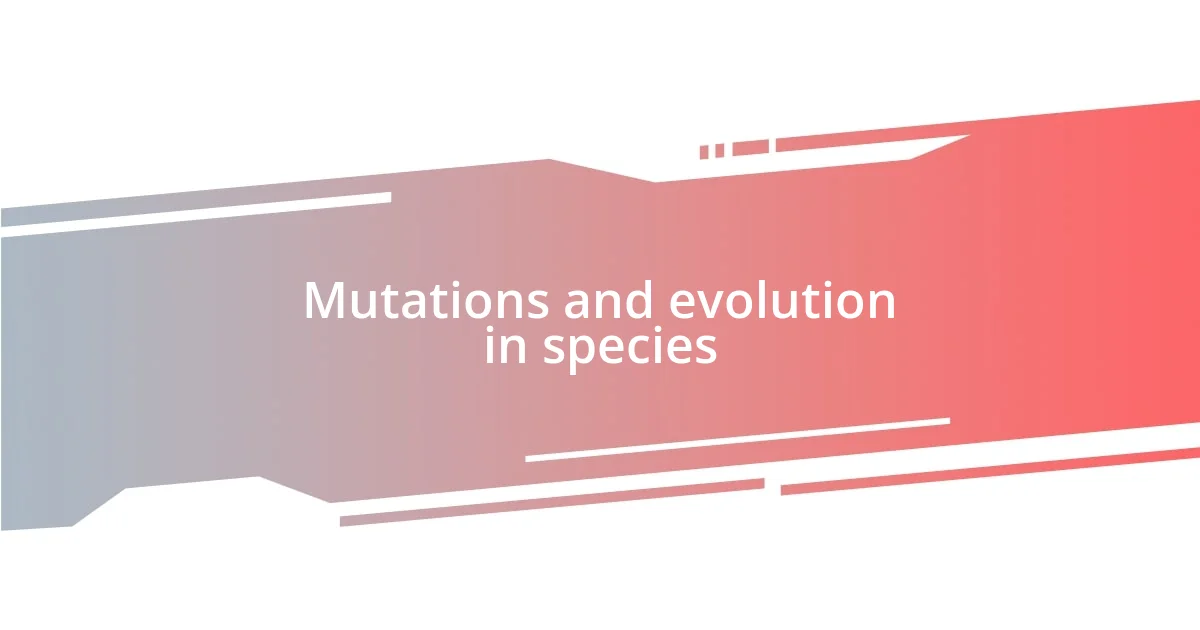
Mutations and evolution in species
It’s fascinating to think about how mutations are truly the architects of evolution. For instance, I recall reading about the peppered moth in England, which changed from light to dark during the Industrial Revolution. This color change was a direct result of genetic mutations that allowed the moths to better camouflage themselves against soot-covered trees, showcasing how mutations can directly influence a species’ ability to survive in changing environments.
Moreover, some mutations can lead to entirely new traits that benefit a species over time. I often think about Darwin’s finches, which developed varying beak shapes based on the type of food available on their respective islands. Each mutation brought about unique adaptations, allowing them to thrive where others might struggle. Isn’t it incredible to realize that these small changes, occurring over generations, shape the biodiversity we see today?
Reflecting on these examples makes me wonder about the potential impacts of mutations we still don’t fully understand. What other hidden adaptations are bubbling beneath the surface, waiting for the right environmental pressure to reveal their benefits? The beauty of mutations lies in their unpredictability, a reminder of nature’s resilience and creativity in the face of change. As we continue to study genetic variations, I can’t help but feel excited about the possibilities they hold—not just for evolution, but for our understanding of life itself.
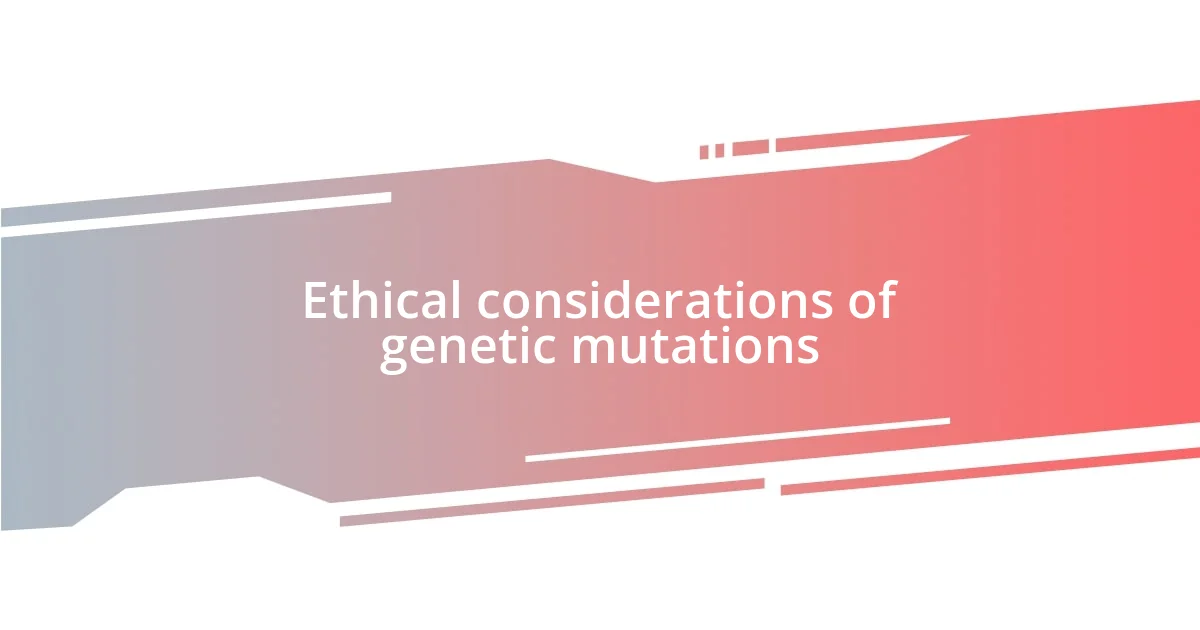
Ethical considerations of genetic mutations
Ethical considerations regarding genetic mutations often stir complex emotions and debates. Personally, I’ve grappled with the implications of whether we should alter our genetic makeup or that of our children. It raises the question: at what point do we draw the line between enhancement and playing God? I remember a discussion at a bioethics seminar where someone argued fiercely that manipulating genes could lead to a slippery slope of eugenics—an idea that sends shivers down my spine.
Privacy concerns also weigh heavily on the ethical scale. When I underwent genetic testing, I felt hopeful for the knowledge it could provide, yet I was left pondering who else might gain access to that information. Can we trust that such sensitive data will be safeguarded? The reality is that the potential for genetic discrimination is very real, and it got me thinking about how fragile our autonomy over our own genetic information can be.
Lastly, there’s the issue of consent, especially regarding future generations. I often wonder if it’s ethical to make genetic decisions for our unborn children based on potential risks. How can we ensure a balance between protecting them from harm while respecting their right to choose their path in life? The complications here are profound, and every time I reflect on it, I feel a mix of excitement and trepidation over the future of genetic advancements.
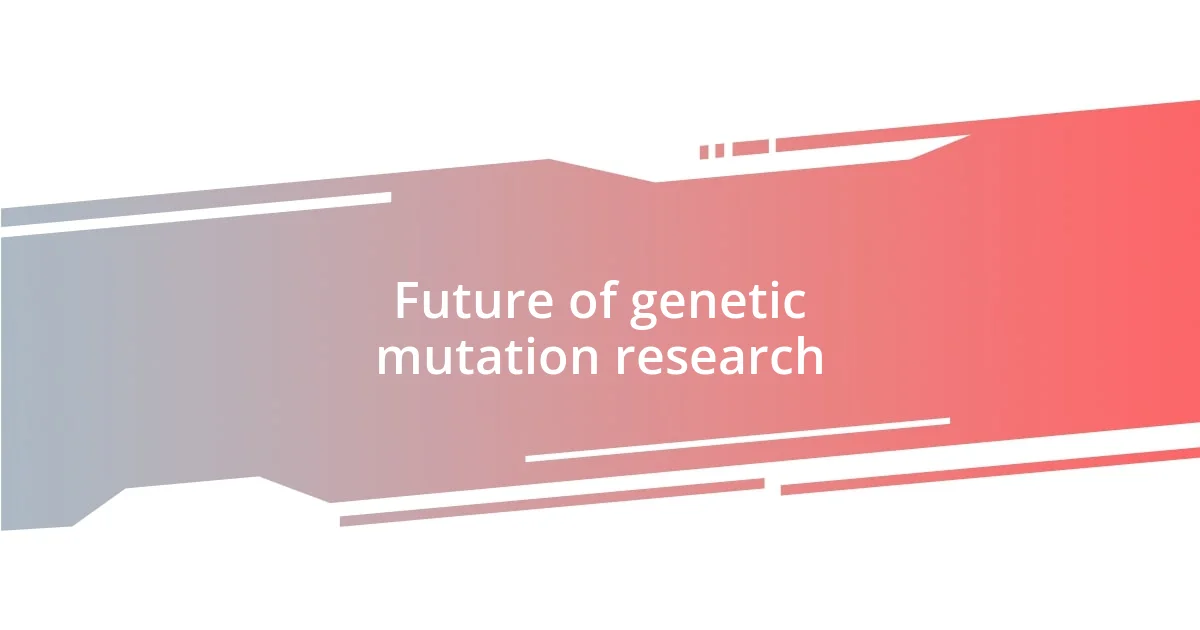
Future of genetic mutation research
The future of genetic mutation research is poised to uncover remarkable insights that could reshape our understanding of health and disease. Recently, I attended a conference where a scientist discussed CRISPR technology and its potential to correct genetic mutations at their source. Imagine the possibilities: diseases that once seemed unavoidable could potentially become preventable. Isn’t it exhilarating to think that we might soon have the means to edit out life-altering conditions before they even manifest?
In addition, I believe that advancements in artificial intelligence will revolutionize how we study genetic mutations. Algorithms can sift through vast amounts of genomic data, identifying patterns and connections that might elude even the most experienced researchers. This intersection of genetics and technology feels like an exciting new frontier. It makes me question: how will this enhanced understanding transform the way we approach personalized medicine?
Moreover, I often find myself contemplating the ethical dimensions of these advancements. As we’making strides in understanding genetic mutations, are we prepared for the societal implications that come with it? The potential for creating genetically modified organisms—or even altered humans—poses profound questions about identity and diversity. How do we balance innovation with the respect for natural ecosystems and human integrity? Navigating this landscape will require thoughtful discourse, as the future of genetic mutation research holds both promise and challenges waiting to unfold.










